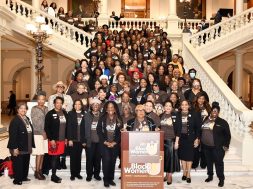
Year of Black Republican? JC Watts Seems Optimistic

While Watts certainly referenced his gridiron past, his main goal was to remind the local GOP faithful about the need to avoid becoming “Democrats Lite” in this election cycle, one in which it is possible that the political pendulum that swung left two years ago may be about to turn right.
In a year where over 30 Black Republican have qualified for Federal office, Watts acknowledged the historic selection of Representative Jennifer Carroll who, last week, joined Rick Scott in hopes of becoming Florida’s first black lieutenant governor.
Watts, who acknowledged his longtime friendship with Carroll, further lauded GOP efforts to reach out to minority voters as an example of diversity without the need to enact quotas.
Indeed, Tuesday’s luncheon had several notable black Republicans in attendance including former Florida State football stars Peter Boulware and Corey Simon, both of whom made Tallahassee their homes upon retirement from the NFL.
While listening to Watts outline why conservative ideology is best situated to address the domestic and foreign crises facing America, it was clear, as Leon County Republican Executive Committee member Jeff Howell asked, that Watts, potentially, could mount a campaign for president at some point in the future.
Should Watts choose such a path, it will be very interesting to see if the same would herald a paradigm shift in which blacks that agree with conservative dogma finally make the switch back to the GOP.
As I have noted several times in my column space, a plethora of key tenets within the Republican Party platform are consistent with ideals long espoused in Black communities nationwide. From counseling against abortion on demand to welfare, to even the recently caustic debates on same-sex marriages, a visit to a predominantly black church on any given Sunday will find preachers whose socially relevant sermons sound like scripts from the GOP platform.
And yet, during any given election cycle, better than 85% of black voters cast ballots for Democrat candidates, many of whom have vastly different views on these topics.
Why?
Simply stated, two names come to mind: Franklin Roosevelt and John F. Kennedy. Never mind that both had their share of flaws with respect to racial issues, they were elevated to nearly iconic status in the black community for the former’s leadership out of the Great Depression and World War II, and the latter’s reluctant, albeit highly visible, advocacy for civil rights.
And with respect to civil rights, while modern Republicans correctly point out the fact that Southern Democrats were responsible for obstructing the Civil and Voting Rights Acts of the mid-60’s, few fail to consider that some of these same Southern Democrats soon switched to the GOP.
Thus is the basis for the overwhelming black aversion to individuals like the late Jesse Helms, who drew enmity from black voters in North Carolina in 1990 when, while facing Harvey Gantt, the black former mayor of Charlotte North Carolina, he aired a commercial depicting a white hand crumpling a rejection slip with a voice over saying “you needed that job and it just had to go to a minority.”
Such commercials and similar gaffes are not the sole province of the GOP, mind you, but the truth is that much of the major black media and civil rights organizations are so in lock step with the Democrat party that more often than not, the lines between advocating for civil rights and advocating for the Democrat liberal agenda are blurred. This leads to the hypocrisy of such leaders who correctly admonish Jesse Helms, but refuse to speak out against Bill Clinton, who suffered from acute foot-in-mouth disease while implicating race during the Democrat primary in 2008.
Which leads me to conclude that as America becomes further removed from the rigid days of Jim Crow and blatant racial animosity, there is the substantial likelihood that the GOP will inevitably have more black members, candidates and voters as the core principles will become more important than the personalities. Whether it is the aforementioned social issues or lower taxes, which most black business owners and chambers of commerce openly support, in time, the numbers will hopefully level out while providing leverage that will ensure that neither party neglects or takes black voters for granted.






